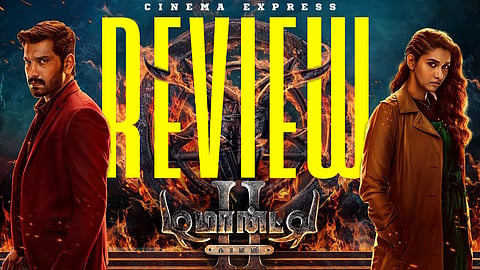Demonte Colony 2 Movie Review: Haunted by vapid scares and dated tropes
Demonte Colony 2(2 / 5)
The Tamil film industry’s sequel curse is more complicated than just a bad addition to the franchise. In an overwhelming number of cases, Tamil film sequels have almost nothing to do with the first film, both narratively and thematically. Demonte Colony 2 stands firmly apart from other Tamil sequels in this regard. The film goes to great lengths, dedicating almost a good chunk of the first half, to explain why a sequel is required and how the events of the first film directly affect the events of the sequel. Refreshing as this might be, the story reasons that connect the two films feel needlessly contrived. Further, dated tropes like twins-who-grew-apart and dead-lover-trapped-in-hell, are employed to keep the reasons for the sequel alive.
The film begins with an eerie found footage video of a man jumping from the topmost apartment of a high-rise building. The staging is perfect, the mood is established and we are off to a great start. Then, we are introduced to Priya Bhavani Shankar’s Debbie. Her story of how she loses a loved one to a mysterious suicide and how that affects her is established through an expository yet functional dialogue exchange between three characters. Right after this scene, the film decides to show us a melodramatic montage of everything established in the exposition. This seems to be a recurring pattern in the film: An exposition followed by a scene visualising what we just heard. Maybe the filmmaker wanted us to feel the impact of the scene that much more but in that case, he should have decided to choose between either of the options or at least made the montages more engaging. The narrative crumbles under its own weight when we are told about the conflict between Srinivasan (Arulnithi) and his estranged twin brother Raghu, and how the haunting from the first film affects both of them and Debbie’s dead husband. Raghu’s character introduction is laid out through a supposedly humorous scene, which feels horribly misplaced in an otherwise intense film.
Speaking of intensity, Demonte Colony 2 does everything it can, from jumpscares to hyperventilating victims, to dark haunted rooms, and unbearably loud music, to make sure we feel a sense of dread. However, very little of the horror scenes work. This could either be because the poor VFX takes you out of the experience, we don’t connect with the characters, or the horror scenes themselves do not feel inventive enough. For example, the evil spirit’s main form of offensive attack seems to simply throw the victims around the room, so we hardly feel any sense of danger for the characters. Except for the opening suicide and the one sequence set inside a room with infinite reflections, we do not feel like the evil spirit is an actual threat. As mentioned earlier, the overwhelming, ear-drum-shattering background score makes sure that there is no build-up of tension.
From Raghu’s past as a lonely child, Debbie’s husband being trapped in Demonte’s hell, and the mystery around Demonte’s human helper, and Demonte’s own past in 5th century Portugal, several threads were opened but left unexplored, to be opened up again for the sequel. These do not register as interesting teases but come across as desperate sequel-baits. On the one hand, the film employs tried and tested horror tropes like a religious artefact creating a safe zone where the evil entity cannot come into. Ironically, these dated tropes work better than the new-age ideas the film throws at us like quantum entanglement. Priya Bhavani Shankar gives a highly expressive performance that still fails to give authenticity to the emotions of the character. Arulnithi’s measured and distant performance seems to suit the chaotic tonality of the film better. From tropes to character motivation, to paranormal elements, Ajay Gnanamuthu seems to know everything about what works in a horror film but does not seem to understand what would work for this particular film. Demonte Colony 2’s desperate attempts to look and sound like every horror film, ends up making it no better than its antagonistic evil entity—who has no purpose other than to make more ghosts like himself.

